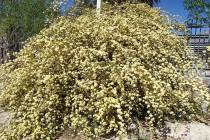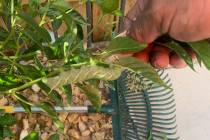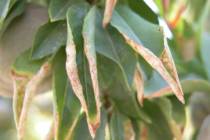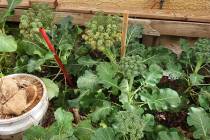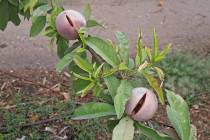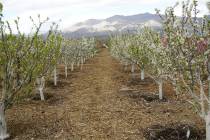Briefs
Information about radon, test kits featured at presentations
Two radon presentations are being offered through University of Nevada Cooperative Extension's Radon Education Program this spring.
The first, on Saturday, will be held at the Clark County Library, 1401 Flamingo Road, at 11:30 a.m. The second will be held at the Multigenerational Center in Henderson on May 12 at 2:30 p.m. Free test kits will be offered at each presentation.
The Environmental Protection Agency estimates 21,000 Americans die each year from lung cancer caused by indoor radon exposure, which is the leading cause of lung cancer among nonsmokers.
In Clark County, 7.7 percent of the homes tested for radon have found levels above the EPA's action level.
Radon is an odorless, colorless, invisible gas that can reach harmful levels when trapped indoors. The only way to know what the radon levels are inside a home is to measure them.
A simple three-day test can determine if a house has a radon problem. If high levels of radon are found, there is a way to reduce or mitigate radon levels.
Test kits are available at Cooperative Extension offices statewide for a nominal fee. In Clark County, they are available at the UNCE office, 8050 Paradise Road, Monday through Friday from 8 a.m. to 5 p.m.
Call the Nevada Radon Hotline for more about the test kits at 888-723-6610.
For further information or to schedule a presentation, call Laura Au-Yeung at 702-257-5550, email her at au-yeungl@unce.unr.edu, or visit the radon website at www.RadonNV.com.
Green industry training offered in English, Spanish
University of Nevada Cooperative Extension is offering two free training sessions during April designed to enhance employability skills and increase job retention in the green industry (nursery, landscaping and landscape maintenance) in Clark County and surrounding counties.
Through the Focusing on the Needs of Today's Hispanic Workforce project, the classes will be offered in English and in Spanish on April 10 and 16. Participants will receive a certificate for each class.
The sessions are open to any private, public employer and the public. Classes are taught at the Lifelong Learning Center, 8050 Paradise Road, from 5:30-
8:30 p.m.
The first class, Looking at Mistakes in Landscape & Knowing How to Solve Them, on April 10 will cover planting, staking, pruning and growing palms. The session includes hands-on activities and opportunities to ask questions. Class two, Recognizing Plant Names, How They Grow & Native vs. Non-Native Plants, on April 17 will cover identifying various plants types.
The training also includes materials focusing on improving English skills, some math skills and safety/worker protection topics .
For more information and to register for this free series, contact M.L. Robinson at 257-5529 or robinsonm@unce.unr.edu, or Marcel Fernando Schaerer (Spanish) at 275-5580.
Funding for the Hispanic Green Industry training is provided by United States Forest Service through the Nevada Division of Forestry.









